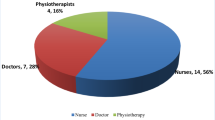Abstract
Data sources
Reports were identified using the Cochrane Stroke Group and Oral Health Group trials registers, the Cochrane CENTRAL trial register, Cochrane Library, Medline, Cinahl, Research Findings Electronic Register, National Research Register, ISI Science and Technology Proceedings, Dissertation Abstracts and Conference Papers Index, and the reference lists from relevant papers. Authors and researchers in the field were also contacted.
Study selection
Randomised controlled trials (RCT) that evaluated one or more interventions designed to improve oral hygiene were selected. Trials based on a mixed population were included, provided it was possible to extract data specific to individuals post-stroke.
Data extraction and synthesis
Two review authors independently classified identified trials according to the inclusion and exclusion criteria, assessed the trial quality and extracted data. Clarification was sought from study authors when required.
Results
Eight eligible RCT trials were identified but only one provided stroke-specific information. In it, an oral healthcare education training programme delivered to nursing homecare assistants was compared with a delayed training intervention in the control group. Comparisons were made at 1 and 6 months after the intervention, using primary outcome measures of dental plaque and denture plaque, and three secondary outcomes. The data available for the 67 individuals who had suffered a stroke (obtained from the larger cluster-RCT) showed that denture plaque scores were significantly reduced up to 6 months (P<0.00001) after the intervention. Staff knowledge (P 0.0008) and attitudes (P 0.0001) towards oral care also improved significantly despite high staff turnover rates.
Conclusions
Based on one study with a small number of stroke survivors, providing specialist oral care training for carers in a nursing-home setting improves their knowledge of and attitudes towards the provision of oral care. In turn, residents dentures were cleaner, although other oral hygiene measures did not change. Further evidence relating to oral care interventions is severely lacking, in particular with reference to care in hospital for those following stroke.
Similar content being viewed by others
Log in or create a free account to read this content
Gain free access to this article, as well as selected content from this journal and more on nature.com
or
Author information
Authors and Affiliations
Additional information
Address for correspondence: Dr Marian Brady, Programme Leader, Nursing, Midwifery and Allied Health Professions Research Unit, Glasgow Caledonian University, Cowcaddens Road,Glasgow,G4 0BA, UK. E-mail: m.brady@gcal.ac.uk
Brady M, Furlanetto D, Hunter RV, Lewis S, Milne V. Staff-led interventions for improving oral hygiene in patients following stroke. Cochrane Database Syst Rev 2006; issue 4
Rights and permissions
About this article
Cite this article
Edwards, M. Staff training improved oral hygiene in patients following stroke. Evid Based Dent 9, 73 (2008). https://doi.org/10.1038/sj.ebd.6400593
Published:
Issue date:
DOI: https://doi.org/10.1038/sj.ebd.6400593



